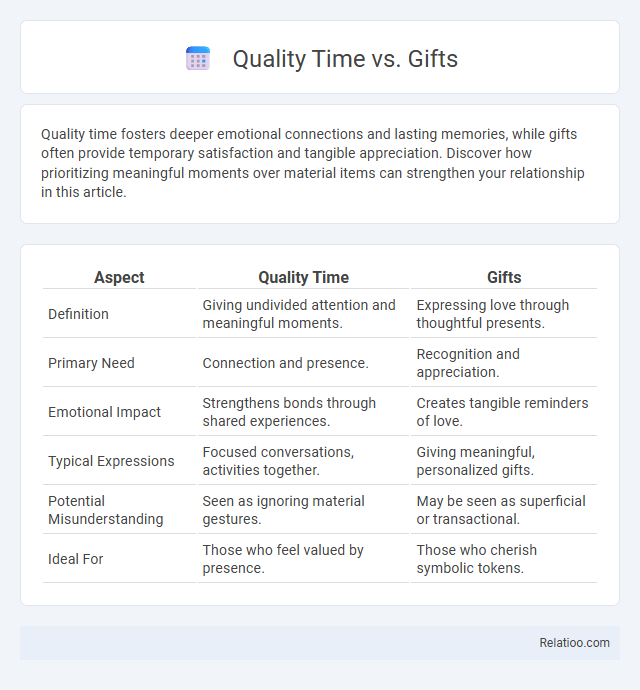Quality time fosters deeper emotional connections and lasting memories, while gifts often provide temporary satisfaction and tangible appreciation. Discover how prioritizing meaningful moments over material items can strengthen your relationship in this article.
Table of Comparison
| Aspect | Quality Time | Gifts |
|---|---|---|
| Definition | Giving undivided attention and meaningful moments. | Expressing love through thoughtful presents. |
| Primary Need | Connection and presence. | Recognition and appreciation. |
| Emotional Impact | Strengthens bonds through shared experiences. | Creates tangible reminders of love. |
| Typical Expressions | Focused conversations, activities together. | Giving meaningful, personalized gifts. |
| Potential Misunderstanding | Seen as ignoring material gestures. | May be seen as superficial or transactional. |
| Ideal For | Those who feel valued by presence. | Those who cherish symbolic tokens. |
Understanding Quality Time and Gift Giving
Quality time emphasizes meaningful interactions that strengthen relationships through shared experiences and focused attention, promoting emotional connection and mutual understanding. Gift giving serves as a tangible expression of appreciation or affection, often symbolizing thoughtfulness and personal significance tailored to the recipient's preferences. Understanding the distinction between quality time and gifts enables individuals to effectively communicate care in ways that resonate best with loved ones' emotional needs and love languages.
The Psychology Behind Quality Time
The psychology behind quality time reveals that meaningful interactions foster emotional bonding and long-lasting satisfaction more effectively than material gifts or verbal expressions alone. Research shows that shared experiences activate reward centers in the brain, reinforcing feelings of trust and attachment that enhance relationship stability. By prioritizing quality time, you nurture deeper connections that promote mental well-being and mutual understanding.
Why Gifts Matter in Relationships
Gifts serve as tangible symbols of affection and thoughtfulness, reinforcing emotional connections in relationships by showing care and effort. Unlike quality time, which requires physical presence, gifts can express love and appreciation even across distances and busy schedules. They hold sentimental value and create lasting memories that strengthen bonds over time.
Emotional Impact: Quality Time vs. Gifts
Quality time fosters deep emotional connections by creating shared experiences that strengthen bonds and build lasting memories. Gifts provide tangible symbols of affection, but often lack the personal engagement that enhances emotional intimacy. Emotional impact is generally stronger through quality time, as it encourages meaningful interaction beyond material expressions.
Cultural Perspectives on Expressing Love
Cultural perspectives on expressing love reveal diverse preferences among quality time, gifts, and verbal expression, reflecting societal values and traditions. In collectivist cultures, prioritizing quality time with family and community underscores relational harmony, while material gifts often symbolize respect and status in more hierarchical societies. Verbal expressions of love vary widely, with some cultures valuing explicit affirmations and others emphasizing indirect communication or nonverbal gestures to convey affection.
Building Stronger Bonds with Presence
Quality time with loved ones fosters deeper emotional connections by prioritizing presence and shared experiences over material gifts. Your genuine expressions of care and attention during these moments strengthen trust and understanding, creating lasting memories that gifts alone cannot achieve. Investing in meaningful interactions elevates relationship satisfaction and nurtures a foundation of mutual support and affection.
When Gifts Enhance the Relationship
Gifts enhance relationships most effectively when they reflect genuine understanding of Your partner's preferences and values, fostering emotional connection beyond material value. Thoughtful presents can serve as tangible reminders of shared memories and appreciation, complementing quality time and heartfelt expression. Choosing meaningful gifts aligned with Your partner's interests strengthens intimacy and reinforces the emotional bond.
Navigating Different Love Languages
Navigating different love languages requires understanding that quality time, gifts, and expressions serve unique emotional needs and communication styles in relationships. Prioritizing quality time fosters deep connection and attentive presence, while thoughtful gifts symbolize appreciation and tangible affection. Expressive words and gestures deliver emotional validation, making it essential to recognize each partner's preferred love language to enhance mutual understanding and intimacy.
Choosing the Right Way to Show You Care
Choosing the right way to show you care depends on understanding whether the person values quality time, thoughtful gifts, or heartfelt expression most. Quality time strengthens bonds through shared experiences, while gifts provide tangible symbols of affection, and expressions of love communicate genuine feelings directly. Tailoring your approach to the individual's preferred love language ensures your care is both meaningful and appreciated.
Striking a Balance: Time and Thoughtful Gifts
Striking a balance between quality time and thoughtful gifts enhances relationship satisfaction by addressing emotional needs and personal preferences. Investing meaningful experiences together fosters deeper connections, while carefully chosen presents demonstrate understanding and care. Aligning both approaches ensures communication of love in diverse and impactful ways.

Infographic: Quality Time vs Gifts
 relatioo.com
relatioo.com